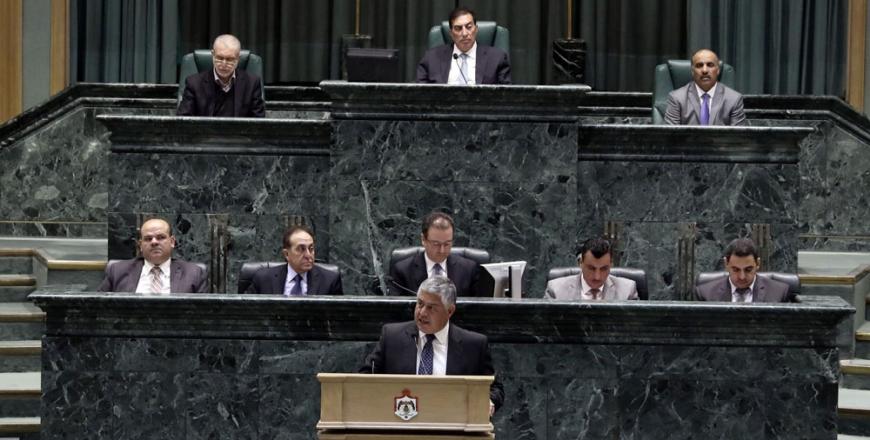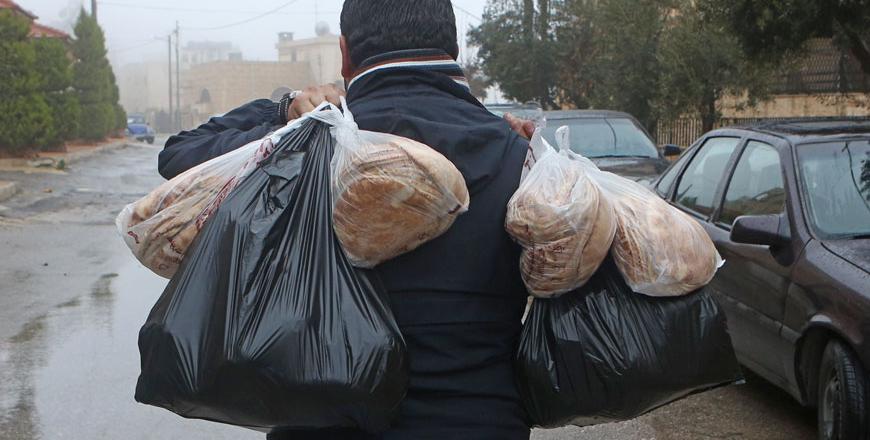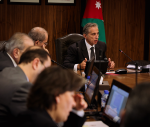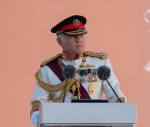You are here
Government presents draft budget law to Parliament
By JT - Nov 30,2016 - Last updated at Nov 30,2016

Finance Minister Omar Malhas details the 2017 draft budget in a speech before the Lower House on Wednesday (Photo by Osama Aqarbeh)
AMMAN — The Lower House on Wednesday listened to the state budget draft law speech delivered by Finance Minister Omar Malhas, the Jordan News Agency, Petra, reported.
In the speech, Malhas outlined the government’s plan to salvage the economy, staggering amidst regional turbulence and a huge refugee crisis.
Highlighting the main features of the budget, Malhas said that public spending, capital and current, is estimated at JD8.946 billion while revenues, domestic plus foreign aid, are forecast at JD8.119 billion.
During the session, chaired by Lower House Speaker Atef Tarawneh and attended by Prime Minister Hani Mulki, the minister also presented forecasts for the independent government agencies’ allocations for 2017, which are included in a separate draft law.
The government’s plan entailed 17 points and 27 forecasts for spending and revenues in both draft laws.
Both drafts include proposed projects and activities the government intends to implement according to priorities compatible with the Jordan Vision 2025 and the governorate development programme, Malhas said, adding that they were prepared in coordination with local communities to determine their needs and priorities.
Malhas said that regional crises have affected Jordan in various ways, leading to an unhealthy increase in public debt and slower economic growth that is not sufficient to improve living conditions or reduce unemployment rates, adding that the repercussions include added financial burdens, both direct and indirect, because of the Syrian refugee influx, in light of inadequate international support.
Malhas said the government adopted a new financial and structural reform programme in cooperation with the International Monetary Fund (IMF), which includes a set of policies and measures to help the national economy overcome challenges facing it.
These policies are also supposed to create a proper environment to achieve genuine and sustainable economic growth with ratios surpassing the population increase rate, which in recent years saw a huge increase that “even major economies cannot bear”, Malhas said.
The policies and measures are not limited to boosting revenues and rationalising public spending, but also include a set of reform measures, the most significant of which is the completion of draft laws to improve the legislative and regulatory framework concerning the banking sector, and to boost the business environment.
The 2017 state budget draft law aims at implementing various measures including commitment to implementing the articles and measures entailed in the 2017-2019 financial and structural reform programme, agreed upon with the IMF and focusing on studying the economic impact of capital projects.
The bill focuses on implementing the 2016 Jordan Investment Fund Law, which encourages incoming incentivised investments in designated projects.
The bill supports the National Strategy for Human Resources Development 2016-2025, according to the minister, as a comprehensive reform plan that seeks to elevate the education quality with all levels, with a focus on vocational education.
The government will continue issuing Islamic Sukuk (bonds) to diversify the funding resources and expand the base of investors in the government borrowing instruments in compliance with the general framework to manage public debt. It will also work to boost the concept of self-reliance in covering public spending through enhancing tax collection and minimising tax evasion, Malhas said.
The forecasts of spending and revenues for the state budget and independent government units’ budgets draft laws for 2017 are based on various possible scenarios and financial measures, including not issuing any budget supplements except under extremely urgent conditions, Malhas said.
The possible scenarios and measures include the routine annual increase in employees’ salaries and pension allocations for both civil and military retirees and continuing the bread subsidy, which, he said, will witness better controls to ensure that it benefits the targeted beneficiaries.
The gross domestic product (GDP) is expected to grow at fixed prices at a rate of 3.3 per cent in 2017, 3.8 per cent in 2018 and 4 per cent in 2019, Malhas said.
The inflation growth rate measured by relative change in the index of consumer prices is forecast at 1.9 per cent in 2017 and 2.5 per cent in both 2018 and 2019.
Exports of commodities are expected to grow by 6.5 per cent in 2017, 7.5 per cent in 2018 and 7.3 in 2019 while imports are expected to grow by 3.4 per cent in 2017, 3.2 per cent in 2018 and 4.3 per cent the year after.
Malhas also said that the measures include having the Central Bank of Jordan maintain a proper level of foreign reserves during the next three years, enough to cover the Kingdom’s imports of commodities and services for no less than six months.
Presenting brief forecasts for the 2017 budget, Malhas said that local revenues are expected to reach JD7.342 billion in 2017, which is more than the re-estimated figure in 2016 of around a JD1 billion or 16 per cent.
Foreign grants for 2017 are estimated at around JD777 million; distributed at a JD392 million from the Gulf Cooperation Council (GCC) grant and JD385 million from donor countries, foremost of which are the US and the EU.
The government heeded the social aspect while drafting the 2017 budget, Malhas said, adding that it took the necessary measures to protect those with limited incomes, noting that financial allocations for the social safety network stood at around JD654 million.
Capital spending for 2017 is estimated at JD1.317 billion, which Malhas said is more than its value re-estimated by around 2016 of around JD149 million or 12.7 per cent, noting that the forecasts did not include any allocations for furniture or cars.
The capital spending in 2017 focused on local development projects (24.6 per cent), roads (10 per cent), education (9.8 per cent), health (9 per cent), energy (8.4 per cent), water (6.1 per cent), and transporation (4.1 per cent), while the rest is focused on projects funded by the GCC.
The budget deficit in 2017 is expected to narrow after receiving the foreign grants by around JD270 million to reach JD827 million, a 2.8 per cent of the GDP, compared with 4 per cent in 2016, Malhas said, adding that the drop is expected to continue to reach 0.3 per cent in 2018.
Before the grants, the deficit is expected to go down to 5.5 per cent from the GDP compared with 7.2 per cent in 2016.
As for expectations related to the independent government units’ budgets draft law for 2017, Malhas said that the total revenues for government units is estimated to reach around JD1.666 billion next year compared with the JD1.710 billion re-estimated in 2016.
The net deficit, before government funding, is expected to reach around JD116 million in 2017 compared with JD30 million re-estimated in 2016.
The government is looking forward to cooperate with the House to endorse the draft laws, Malhas concluded.
Also on Wednesday, the Lower House referred both draft laws to its finance committee.
Several MPs at first glance of the draft laws criticised the government’s “collector approach”, resorting solely to increasing taxes and fees, and because of cuts to capital spending and not including allocations for pay increase or recruitment.
Related Articles
AMMAN – The government on Sunday submitted to the Lower House the draft 2016 general budget law in addition to the bill governing the budget
The Cabinet has endorsed the draft state budget law for 2015, with a slight expansion of 3.2 per cent in spending and an estimated deficit of JD688 million.
AMMAN — State agencies concerned with ensuring a smooth public life during the expected snowstorm have said that this year’s plans include n
















